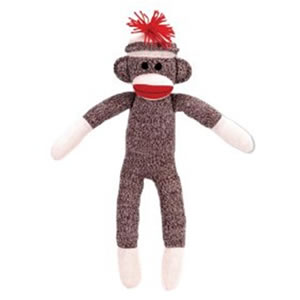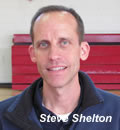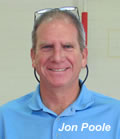Summer: The Ultimate Planning
Period
written by Steve
Shelton, Jon Poole,
Radford University, Radford, VA
As children excitingly await the end of the school year and
the beginning of summer, sometimes they forget that teachers
look forward to a break, too! In addition to relaxation and
a chance to reconnect with family and friend, summer can be
the ultimate planning period for professional development
as it allows brainstorming typically not possible during the
workday. Some of that brainstorming, we believe, should include
designing creative program extensions which serve as a way
to showcase our programs to parents and colleagues.
Both authors also believe, unfortunately, that physical education
teachers traditionally do a poor job of this when compared
to our specialist brethren, art and music teachers. Annual
elementary school field days held in the spring are one of
the few times that physical educators extend their program
into the entire school community. Art and music teachers,
on the other hand, tend to extend their programs throughout
the school year.
Both authors have children currently in K-12 schools and
have homes filled with art work proudly displayed on refrigerators,
or framed on family room walls. What parent could possibly
resist the artistic skills of their child? Exactly our point.
While the art teacher fills the school hallways with student
work in prominent locations, where does the physical education
teacher display student work? Further, what would a physical
education teacher display?
This ability to decorate school walls and send home artwork
presents a powerful message. Similarly, both authors have
sat transfixed in school auditoriums as music teachers directed
our children in wonderful performances complete with singing,
playing of musical instruments, and even dancing at times.
The powerful message being sent, we believe, is that parents
can point at a picture on the refrigerator, or point at their
child on a stage, and say without hesitation, "my child
learned that at school." What do physical
educators offer a parent to point at?
Traditionally, classroom teachers assign homework almost
daily and maintain nearly constant communication with parents.
By spending some time at a local elementary school in your
area, you might also find a similar pattern at work. In fact,
we like to describe this approach as an effective pattern
of work. Classroom teachers take advantage of opportunities
to advertise the potential of their programs to students,
community members, and parents by extending their programs
beyond the normal obligations involved during the regular
school day. Homework can certainly be one form of this important
program extension.
One little girl in our area, for example, recently received
her third grade homework assignment that included an opportunity
to check out a classroom book bag filled with a Sock
Monkey doll, Sock Monkey story
book, composition notebook, and an assignment list that
shared that she was to keep the Sock Monkey with her over
the weekend (Bell, 2009). She was thrilled to take Sock Monkey
on multiple adventures over the course of one weekend, while
reading to her new friend, and later writing about her experiences.
Her journal entries, and the insertion of related photographs
depicting the details of her adventures with Sock Monkey,
were recorded in the same composition notebook her classmates
used; thus creating a running record that could later be expanded
by additional classmates.
Each successive student could enjoy reading about classmate
experiences prior to adding their own. This classroom teacher-based
Sock Monkey assignment sparked the idea for the elementary
physical education teacher-based Sock Monkey assignment found
at the end of this article.
The time students are actually engaged in activity that promotes
learning is of concern to all physical educators who support
motor skill acquisition and fitness attainment in their classes.
With such limited time allotted for physical education, teachers
might consider using unique homework assignments that employ
strategies, like approach tendencies and generalization,
to gain additional practice time for students. This added
practice can afford children with opportunities to engage
in the subject matter taught during the school day in another
location, and is supported by research relative to approach
tendencies that allow students to enjoy and become attracted
to activities (Hawkins, 2009).
Generalization, the process of learning a skill
in one setting and transferring it to another setting, can
be a powerful way to improve skill levels. Many students are
originally exposed to concepts and skills in physical education
class, but must generalize the skills in another setting to
become more proficient movers. Additionally, the intermittent
schedule of reinforcement involved in performing activities
outside of school, and away from the watchful eye of a child's
physical education teacher, has been demonstrated to help
maintain a behavior after it has been established during class
time (Cooper, Heron, & Heward, 2007).
Youth sports can be a wonderful outlet for children to expand
responses and refine skills in an alternative setting. However,
many families have difficulty finding the time or money to
participate in many of these after school programs. Therefore,
homework assignments that allow all students to check out
basic equipment can be a more affordable means for many families
that value activity, but who may have limited resources.
The Sock Monkey assignment highlighted in this article is
offered only as a suggestion for those educators contemplating
new approaches to class assignments. Physical education homework
can be connected to specific units of instruction throughout
the school year. For example, allowing students to check out
a soccer ball, pedometer, and carefully designed task checklist
during a soccer unit might be a great way to promote additional
practice opportunities, and allow parents to play with their
children after the school day ends.
Admittedly, the chance of school equipment getting lost or
broken is a real possibility. The aforementioned check-out
system might be connected to a class reward system to allow
the teacher more control on who can be trusted to return equipment
responsibly upon completion of each assignment period, based
on dependable behaviors displayed during class time.
As you embark on your summer break we hope you will use the
time away from school to consider new and innovative approaches
to enhance student learning, including creative homework assignments
when school resumes in the fall. We believe such novel homework
assignments have the potential to enhance the students' own
affection for the subject matter, promote an added level of
responsibility to safely use and return school equipment,
and enhance motor skills by playing at home.
REFERENCES
Bell, C. (2009). Sock monkey in the spotlight. Somerville,
MA: Candlewick Press.
Cooper, J., Heron, T., & Heward, W. (2007). Applied
behavior analysis (2nd ed.). Upper Saddle River, NJ:
Pearson Education.
Hawkins, A. H., personal communication, July 12, 2009.
Sock Monkey's
Daily Exercise Adventures and Writing Project
Congratulations!
You have been selected to take sock monkey home for this week
(Monday-Thursday). I know you will take sock monkey on some
amazing exercise adventures over the next several days. Please
return sock monkey on Friday morning.
Your Challenge: Actively
go on exercise adventures each day for at least 30 minutes
and hopefully up to 60 minutes. You do not need to complete
all your daily exercise at one time; you can exercise for
as little as 10 minutes at a time and add the minutes throughout
the day. Sock monkey likes a wide variety of exercises.
Directions: Keep
sock monkey with you on your exercise adventures with your
friends and family. Sock monkey loves to ride in bicycle baskets
or wear his special synch bag on your back and you can carry
him with you when you walk, hike, run, and play at the park.
Write a journal entry at the end of each day describing your
time together with Sock Monkey. You should have four journal
entrees (Monday, Tuesday, Wednesday, & Thursday) to turn
in on Friday morning.
Biographies
Steve Shelton is an Instructor for
the Physical and Health Education Teaching Program at Radford
University. He previously taught elementary physical education
for 20 years before coming to Radford University in 2012.
His interests include systematic supervision techniques, the
association between academic achievement and physical activity,
and principles of effective teaching in elementary school
physical education. Steve currently teaches motor development,
cooperative activities, adapted physical education, and supervises
student teachers.
Jon Poole is a Professor and Coordinator for the Physical
and Health Education Teaching Program at Radford University.
He taught previously at the University of Utah and Virginia
Tech before joining Radford University in 2000. He is an advocate
for a more coordinated approach to teaching physical and health
education in K-12 schools with his professional interests
including promoting physically active and healthy living for
K-12 students, health-related fitness education, and teaching
lifetime sports and physical activities. He teaches elementary
and secondary methods courses and supervises student teachers.
Jon has been a regular contributor to PELinks4U since 2000.
(back
to pelinks4u homepage) |






